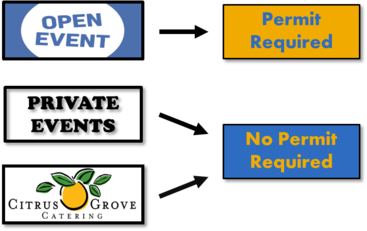This site has been designed to assist you, food service operator, in order to operate a temporary food facility in a safe and sanitary manner, while complying with the requirements of the California Health and Safety Code and California Retail Food Code.
While the same food handling and sanitation practices apply at a temporary food facility as they would at the permanent food establishment, you should be aware of some of the differences.
A temporary food facility usually consists of a fully enclosed tent or booth and is constructed for the duration of the event. Temporary food events can range in the length of time they are operational.
Approved Food Sources
All food/drink sold or distributed on campus must be pre-approved by the Purchasing Department. For more information, contact Matthew Burke at (951) 827-3095.
Off-Campus Food Vendors
Prior to seeking an off-campus food vendor, familiarize yourself with UCOP Policy 5402: Policy Generally Prohibiting Contracting Services.
Equipment Set Up
A commercial grade 10' x 10' canopy with 4-sided mesh walls is required for all food handling/storage.
Cooking Equipment
Gas fired cooking equipment, such as barbecues, are required to be located outside of the temporary food facility and have a minimum of 4 feet clearance between the equipment and the public. No overhang shall be directly above it. All other types of cooking equipment shall remain inside the temporary food facility.
Food Holding and Storage
The temperature danger zone provides an ideal environment for foodborne bacteria to grow, which can potentially lead to foodborne illness.
General food/drink storage shall be a minimum of six (6) inches off the ground and maintained covered while not in use. Only food grade containers shall be used to store food product.
Food Contact Surfaces
All food contact surfaces shall be of smooth and easily cleanable.
Lighting
Adequate lighting shall be provided for any events that occur at night to ensure safe food handling.
Waste Disposal
During the event, all liquid waste shall be stored in a leak proof container. All liquid waste must be disposed into an approved sanitary sewer system.
Sanitizing and Cleaning
Temporary food facilities involving food preparation must have a three compartment sink set up to clean and sanitize all utensils and equipment. Hot water at a minimum of 120°F must be supplied. To properly clean and sanitize, follow the following order: WASH, RINSE, SANITIZE, AIR DRY.
Hand Washing
A hand washing station must be available and easily accessible.
Best Practices
Gloves should be used to prevent contamination of food. When changing gloves, hands should be washed thoroughly for 15-20 seconds with soap and warm water. Gloves should be changed after:
- coughing, sneezing, smoking, and touching hair, face or body
- handling raw foods
- handling chemicals
- taking out garbage
- anything that can contaminate food
Hair restraints should be used to prevent contamination of food. Hair restraints include but are not limited to:
- hats
- hair nets
- hair tied back and braided
